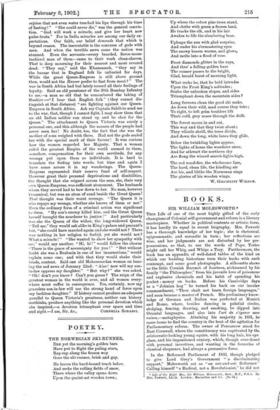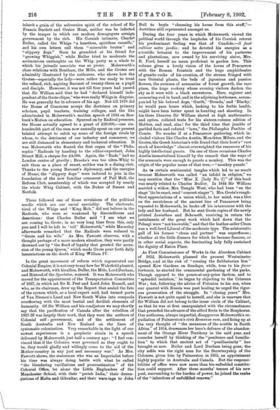BOOKS.
SIR WILLIAM MOLESWORTH.* THIS Life of one of the most highly gifted of the early champions of Colonial self-government and reform is a literary masterpiece. Whether in political contents or artistic form, it has hardly its equal in recent biography. Mrs. Fawcett has a thorough knowledge of her topic; she is rhetorical, epigrammatic, and sarcastic in turn ; her reflections are wise, and her judgments are not disturbed by her pre- possessions, so that, to use the words of Pope, Tories might call her Whig, and Whigs a Tory. Furthermore, the book has an appendix of well-dated tables of the kind on which our budding historians turn their backs with such contempt, and some good photographs. A silhouette shows us the little Cornish Baronet of fourteen, nicknamed by his family "the Philosopher," from his juvenile love of poisonous and explosive chemicals and his habit of spending his pocket - money on books. Before his Cambridge days as a " Johnian hog" he turned his back on our insular commandment, "Thou shalt not learn foreign languages," and soon became a master of French. His preliminary know- ledge of German and Italian was perfected at Munich and Rome, where, besides dancing in palatial circles, sledging, fencing, drawing, and smoking, he dipped into Oriental languages, and also into l'art de s'egarer avec raison,—metaphysics. Attaining his majority in 1831, he came home to find the country in the heat of the agitation for Parliamentary reform. The owner of Pencarrow stood for East Cornwall, where the constituency was captivated by the aristocratic-looking young squire, with his long hair, his eye- glass, and his impassioned oratory, which, though over-dosed with personal invectives, and wanting in the formulas of classical eloquence, had always a persuasive force.
In the Reformed Parliament of 1833, though pledged to give Lord Grey's Government "a discriminating support," Molesworth sat as "an out-and-out Reformer." Calling himself "a Radical, not a Revolutionist," he did not
• Life of the Eight Hon. Sir William Dfolesteorth, Bart., M.P., P.R.S. By Mrs. Fawcett, LL.D. London: Macmillan and Co. pa. dd.] inherit a grain of the subversive spirit of the school of Sir Francis Burdett and Orator Hunt, neither was he infected by the temper in which our modern demagogues arraign government by the rich. His Cornish intimate, Charles Buller, called the Whigs "a. heartless, spiritless canaille," and his own letters call them "miserable brutes" and " slippery dogs." Soon he grumbled sat his friend for "growing Whiggish," while Buller tried to moderate the acrimonious onslaughts on the Whig party as a whole to which his juienile associate was so prone. Molesworth's close relations with Bentham, the Mills, and the Grotes are admirably illustrated by the authoress, who shows how the Grotes—especially the lady—were rather too ready to treat the refined, rich, aspiring Baronet of twenty-three as a pupil and disciple. However, it was not till four years had passed that Sir• William said that he had "declared himself inde- pendent Of the Grote clique," who were really Whigs in disguise. He was generally fax in advance of his age. Not till 1870 did the House of Commons accept the doctrines on primary scholars, pupil teachers, training colleges, and the like adumbrated in Molesworth's maiden speech of 1834 on Roe- buck's Motion on education. Spurred on by Radical pressure, the House actually agreed to a grant of 220,000,—one six- hundredth port of the sum now annually spent on our present belated attempt to catch up some of the foreign rivals by whom, to the detriment of our industry and commerce, we are still distanced in elementary and technical education. It was Molesworth who floated the first organ of the " Philo. sophic " Radicals by handing to the editor-expectant, John Stuart Mill, a cheque for 24,000. Again, the " Rads." had no London centre of gravity ; Brooks's was too ultra-Whig to suit them as a place of resort, neither was it a dining club. Thanks to the young Baronet's diplomacy, and the energies of Hume; the "slippery dogs" were induced to join in the foundation of the now familiar ornament of Pall Mall, the Reform Club, membership of which was accepted by nearly the whole Whig Cabinet, with the Dukes of Sussex and Norfolk.
There followed one of those revulsions of the political needle which are our racial speciality. The electorate, tired of the Whigs and "King Mob," did not believe in the Radicals, who were so weakened by disoomfitures and desertions : that Charles Buller said "I see what we are coming to, Grote ; in no very long time from this, only you and I will be left to 'tell' Molesworth," while Macaulay afterwards remarked that the Radicals were reduced to "(3-rote and his wife." As Mrs. Fawcett observes, with a thought perhaps of a more modern situation, they were partly drowned out by "the flood of-loyalty that greeted the acces- sion of the young Queen," which made Grote pour forth daily lamentations on the death of King William IV.
In the great movement of reform which regenerated our Colonial Empire, it is not easy to say how far Wakefield planted, and Molesworth, with his allies, Buller, the Mills, Lord Durham, and Rintoul of the Spectator, watered. It was Molesworth who moved for the appointment of the Transportation Committee of 1837, in which sat Sir R. Peel and Lord John Russell, and who, as its chairman, drew up the Report that sealed the fate of the system which, as a local expert said, had turned parts of Van Diemen's Land and New South Wales into cesspools overflowing with the most bestial and devilish elements of humanity. Of Sir William and his coadjutors we may shortly say that the pacification of Canada after the rebellion of 1837-38 was largely their work, that they were the authors of Colonial self - government, and of the settlement of South Australia and New Zealand on the lines of systematic colonisation. Very remarkable in the light of our newest experiences is a prophetic strain in a speech delivered by Molesworth just half a century ago : "I feel con- vinced that if the Colonies were governed as they ought to be, thei would gladly and willingly come to the aid of the Mother-country in any just and necessary war." As Mrs. Fawcett 'Iowa, the statesman who was an Imperialist before his time was always doing battle with what he called "the blundering vacillations and procrastination" of the Colonial Office, let alone the Little . Englanders of the Manelxester School, with their "perish India," their denun- ciations of Malta and Gibraltar, and their warnings to John
Bull to begin "cleansing his house from this stuff,"— doctrines still represented amongst us.
During the four years in which Molesworth viewed the political world through the loopholes of his Cornish retreat
his predominant feeling was that of Candide,—/.1 faut cultiver noire jarclin : and he devoted his energies as a scientific botanist to the improvement of his parterres and plantations, now owned by his surviving sister, Mrs.. R. Ford, herself no mean proficient in garden lore. This volume gives a lovely vision of the lawns of Pencarrow with the Roman fountain and the huge amphitheatre Of granite rocks of his creation, of the stream fringed with rare Oriental plants, the beds of japonicas and passion flowers, the avenues of araucarias of forest growth, the rare pines, the huge rookery whose evening visitors darken the sky as it were with a black snowstorm. Here, register and measuring-rod in hand, and in the adjoining hothouses, accom- panied by his beloved dogs, Gurth,"Brenda: and Blocky: he would pass hours which, looking to his feeble health, might have been better spent in hunting and shooting. In his three libraries Sir William slaved at high mathematics and optics, collated texts for his sixteen-volume edition of Hobbes, and read, alas ! for the third time that jumble of garbled facts and refuted "laws," the Philosophic Positive of Comte. No wonder if at a Pencarrow gathering, which in- cluded visitors like Charles Austin, Monckton Milnes, and the Grotes, the Greek historian's wife found that their host's" vast stock of knowledge" almost overweighted the resources of his highly intellectual guests. On one of these occasions Charles Austin immortalised himself by the remark that the ways of the araucaria were enough to puzzle a monkey. This was the origin of the popular name of that tree,—" monkey puzzle."
As to certain sentimental tangles which led to no result because Molesworth was called "an infidel in religion," we may mention that the "Miss X. [lady No. 2] " of this book was nearly. related to Charles Buller. In 1844 Sir William married a widow, Mrs. Temple West, who had been "on the stage "(to be exact, read " concert-singer "). Mrs. Grote's rough- shod appreciations of a union which, to her mind, was a blot on the escutcheon of the ancient line of Pencarrow being repeated to Molesworth, he broke off his intercourse with the lady and her husband. But he sent Grote copies of the newly printed Leviathan and Behemoth, receiving in return the instalments of the great work which laid down that the Pelasgi were "not knowable," and that the leather-seller Cleon was a well-bred Liberal of the moderate type. The aristocratic gall of his former "chum and partner" was superfluous ; whether at the little dinners for which he became famous, or in other social aspects, the fascinating lady fully sustained the dignity of Eaton Place.
As First Commissioner of Works in the Aberdeen Cabinet of 1852, Molesworth planned the present Westminster Bridge, and at the risk of "rousing the Sabbatarian lion" opened Kew Gardens on Sundays, while, true to his furor hortensis, he started the ornamental gardening of the parks. Though opposed to the peace-at-any-price faction, and to "splendid isolation," he began by objecting to the Crimean War ; but, following the advice of Polonius to his son, when our quarrel with Russia was past healing he urged the vigor- ous prosecution of the struggle. In "closing years" Mrs. Fawcett is not quite equal to herself, and she is unaware that Sir William did not belong to the inner circle of the Cabinet, so that he was at first unacquainted with the circumstances that preceded the advance of the allied fleets to the Bosphorus. Our authoress, always impartial, disapproves Molesworth's re- pudiation of Palmerston's civis Bomanus sum, and firing up at the very thought of "the meanness of the scuttle in South Africa" of 1854, denounces her hero's defence of the abandon- ment of the Orange River Territory in the said year, and consoles herself by thinking of the "penitence and humilia- tion" tp which that ancient act of "pusillanimity" has brought us now. Buller and Lord Durham being gone, the city Leda: was the right man for the Secretaryship of the Colonies, given him by Palmerston in 1855, an appointment highly 'populir in Australia and Canada. But the responsi- bilitieà office were now more than his enfeebled constitu- tion could support. After three months' tenure of his new post, succumbing to the burden of power, he joined the ranks. of the "inheritors of unfulfilled renown."











































 Previous page
Previous page